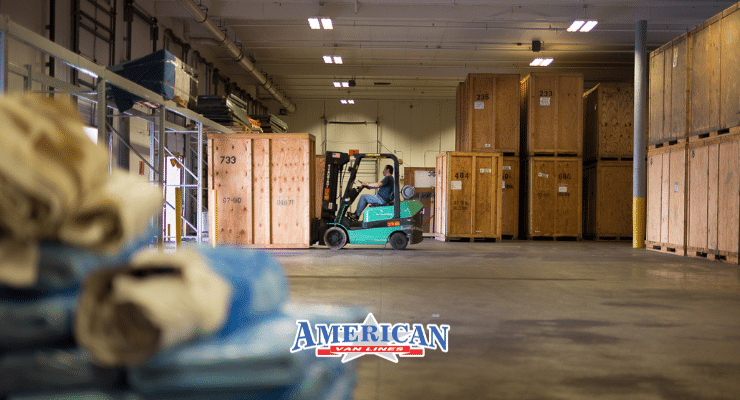Professional moving companies that operate their own storage facilities offer full-service storage. Full service means the movers will pick up your goods, store them in a secure warehouse, and deliver them upon request. If you need to be out of your current house before your new house is ready, full-service storage is the answer. It’s a valued solution for navigating delayed closings or unscheduled repairs on your recently purchased home. Full-service storage works great for people with physical limitations.
People select full-service storage over self-service because it allows you to:
- Avoid making a second move
- Maintain your liability insurance
- Retain your single point of contact.
Avoid Making That Second Move By Choosing Full-Service Storage
The main reason people choose full-service storage over self-storage is to avoid making a second move. If your moving company deposits your goods at a self-storage facility, it’s up to you to move your stuff again to your new home. Whether the delay in gaining admittance to their new residence is scheduled or unscheduled, picking full-service storage means you don’t have to either perform the labor yourself or hire an unknown company in your new town to complete the move.
Full-service movers finish the job. Your goods are typically stored in wooden vaults that hold only your family’s personal goods. The vaults, which are cleaned and sanitized after each use, hold approximately 1,000 pounds each. When it’s time for delivery, your vaults are moved from the storage area to the dock, and the goods are loaded into the moving truck. Ask your storage vendor if they offer locked storage for valuable items as well as air-conditioned storage for climate-sensitive pieces.
Maintain Your Relocation Liability Insurance with Full-Service Storage
Another reason customers choose full-service storage over self-storage is the ability to maintain liability insurance coverage. If you decide to use full-service storage operated by your household goods carrier, the liability insurance you purchased on your goods remains in force while your items are in storage. Since your goods remain in the possession of your moving firm, any liability insurance that was part of your moving contract remains in effect while your stuff is in storage with the same firm.
Long-distance movers are required to include basic insurance as part of each agreement. If you want to expand your insurance coverage because you plan on storing your goods temporarily, most companies require you to add extra insurance before your goods are loaded on board. It’s difficult to upgrade your insurance from the basic included in your contract once your items for storage have been picked up.
Retain Your Single Point of Contact for Continuity with Full-Service Storage
Full-service movers offer better customer service than self-service locations. Your full-service mover knows how many items you have, so they can keep track. Self-service storage facilities can’t help you with your item list. When you use your long-distance mover as your storage host, you retain one single point of contact for both your move and your storage. Familiarity with your move allows your full-service host to serve you better.
It’s much easier to coordinate your delivery when your moving company stores your goods. If you use a self-service unit, you likely must appear on-site to let your local movers into the facility to retrieve your goods. You can avoid the labor that way, but you still have to put in some effort to make sure the connection happens. With full-service movers, you call for delivery and await the call for your final schedule. Your full-service movers are always glad to help you with answers and schedule adjustments.
The Pros and Cons of Using Full-Service Storage Instead of Self-Service
You might be able to save by having your shipper drop your goods in a local self-service unit and hiring local movers to finish the relocation, but then again, you might not. Why take the risk? Professional moving companies that operate storage centers employ efficient methods for storing and delivering your goods. They hire customer service operatives who can provide you with status updates anytime you call. Your self-service storage agent, if you can reach him or her, can’t tell you anything.
A couple of pros and cons for using full-service storage instead of self-service include:
- Pros. Full-service storage is the hassle-free method for storing your goods temporarily. Your mover already maintains a list of your goods from your move, so you’re covered there. Good insurance is available because access to your goods is restricted. Go ahead and try collecting insurance from a self-storage center. When you go from a moving truck to full-service storage, your point of contact remains the same.
- Cons. Due to insurance regulations in the warehouse, full-service storage centers are unable to accommodate walk-in customers. The only way to get your goods from storage is to arrange delivery, which can take two to three weeks. You can’t grab those few items you need until your house is available, so pack wisely. Also, full-service storage is more expensive than self-service because you must pay for delivery.
American Van Lines Operates Three Full-Service Storage Locations
At American Van Lines, our term for full-service storage is “moving and storage.” We’ll grab your gear from any of the 48 continental states and store it in one of our three storage locations until you request delivery. Most of our storage business is connected to our long-distance moving services, but some local clients hire us to pick up, store, and deliver their goods as part of a home renovation. Others hire us when they hire exterminators to fumigate the premises.
American Van Lines runs full-service moving and storage operations in:
- Florida. American Van Lines moved to Pompano Beach, FL, in 1995, where we operate a modern storage center with more than 30,000 feet of storage space.
- Texas. We opened our regional moving hub in Lancaster, south of Dallas, in 2007. It features a state-of-the-art storage center with over 20,000 feet of space.
- North Carolina. Established in 2015, our Greensboro, NC, location contains more than 15,000 feet of climate-controlled self-storage space.







